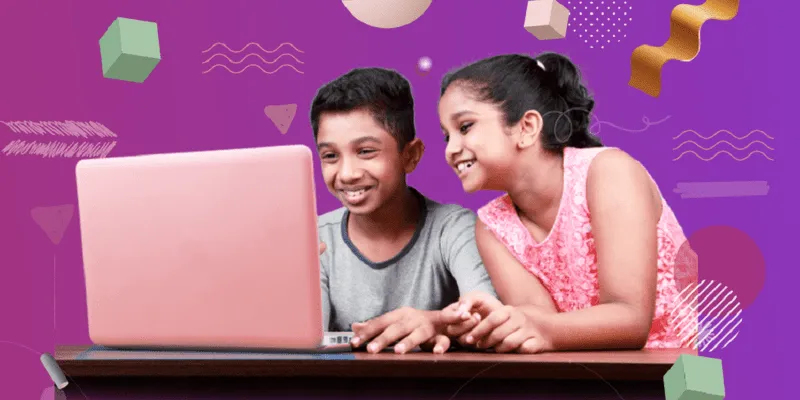Coding for kids: These 6 startups are helping kids become programmers
From CodeYoung to Tinkerly, these six startups are helping kids to gain the required technical skills and make them future-ready.
Coding has become a modern-day toolkit to advance and ease our lives. It’s used everywhere – emojis, sharing memes, booking movie tickets, sending text messages, and even while you’re reading this article — almost everything is possible with just a few swipes and taps, all by coding.
The kids know this. This is why coding has become a buzzword in classrooms across schools in the country. Many students consider it essential to education alongside regular subjects like English, math, and science – to not only open doors for opportunities but also enhance other skills such as problem-solving, reasoning, creativity, logical thinking, and much more.
Here are some kid-focused coding startups that are enabling students to keep up with technology and helping sharpen their minds by imbuing problem-solving and analytical skills.
CodeYoung
Founded by IIT-Delhi alumni Shailendra Dhakad and Rupika Taneja in 2019, the Bengaluru-based startup offers live coding classes to K-12 students.

The startup offers four programmes: app development, Python, Scratch, and web development for the age groups of five to nine, nine to 14, and 14-16. Each course includes 48 classes and costs Rs 19,999. They offer classes twice or thrice a week, depending on the student’s preference.
"Our curriculum goes beyond drag-and-drop block-based programming and provides a real-world coding environment where students are taught industry-level languages like Java and Python. Our aim is to teach kids the fundamentals of logic and problem-solving," Shailendra earlier told YourStory.
In September 2020, the startup raised an undisclosed amount in a seed round of funding led by Guild Capital to scale up in international markets and strengthen academic research, product teams, and technology.
Tekie
Founded by Naman Mukund and Anand Verma in 2017, Bengaluru-based is a live coding platform that brings the art of storytelling to make learning a movie-like experience.

The startup has also created the world’s first animated series on coding to teach text-based coding to kids.
"Coding education is still at a nascent stage in our country, primarily restricted to block-based coding. We want students to go beyond just getting introduced to concepts and learn to write real code. Keeping this in mind, we designed our course to teach text-based coding. We wanted to solve the gap in text-based coding for Class XI–XII students. The original idea was to be a B2B platform that could integrate with the school curriculum. But we iterated a lot on the product front," Naman says.
In May 2021, Tekie raised $1.5 million in seed round funding led by GSV Ventures and Multiply Ventures to scale its operation to support the increasing demand.
Codingal Education
Founded in 2020 by Vivek Prakash and Satyam Baranwal, Bengaluru-based is an online coding platform for K–12 kids.

Y Combinator-backed Codingal enrolled 40,000+ K12 students in 5 months
"Our mission is to inspire school kids to fall in love with coding, and we are building Codingal to deliver high-quality computer science education combined with world-class coding competitions. Codingal plans to build a robust passion economy marketplace for coding education that brings together the best-in-class educators and students who are eager to learn to code," Vivek said.
In September 2021, the startup raised $1.2 million in its seed funding round led by Y-Combinator, Summer Capital, Rebright Partners, and Day One Syndicate to grow, empower, and nurture its rapidly growing community of K-12 students and coding teachers.
Tinker Coders
Founded by Anoop Gautam in 2020, Noida-based offers Python and AI, 3D designing, app development, block-based coding, and Arduino programming courses to K-12 students aged six to 18. Their courses include self-learning, live classes, and recorded videos.

Photo: Tinker Coders | Twitter
The startup claims to have users in many countries, including Australia, the US, the UK, Africa, Southeast Asia, New Zealand, and the Middle East.
"Coding is an integral part of literacy now. Earlier, ‘literacy’ was defined as the ability to read and write. Now, it is the ability to programme and automate machines. It is mandatory to equip kids with future-ready skills to help them get good jobs. Our aim is to create problem-solvers for their communities. Coding is the most convenient way to do that. It allows children to use a digital canvas to express themselves, and also enhances academic performance," said Anoop.
In December 2020, the startup raised undisclosed seed round funding from its parent company, STEMROBO Technologies, to increase market reach, grow its product offerings, and strike B2B partnerships with schools.
Tinkerly
Founded in 2015 by Sharad Bansal, OP Godara, Vivek Pathak, and Kapil Arya, Jaipur-based provides online coding courses to students aged six to 16 from smaller towns in their preferred language.

The startup teaches robotics, AI, and coding with physical kits as a natural progression. It teaches kids not only how to code but also how to create things using that code.
"Tinkerly’s coding courses on robotics, IoT, and AI take the student's learning beyond the screen with a blend of STEM toys in online live classes. It enables kids to design, build, and deploy their code to make cool real-life tech-based projects," Sharad said.
In September 2021, the startup raised Rs 6.5 crore in a funding round by Navneet Tech Ventures to increase consumer awareness, product development, and expand into new categories with vernacular content.
Codevidhya
Founded by Shivram Choudhary in 2016, Jaipur-based is converting classrooms in Indian schools into programming powerhouses. It focuses on teaching kids to code.

The startup works with schools on a B2B model.
"If we shape our children from the grassroots level, they will be skilled in the future. Everyone was thinking in a reactive way. I thought, why should we be reactive; let's be proactive, catch them young, and shape their future," said Shivram.
The startup offers a curriculum based on guidelines shared by CBSE boards and other educational boards.
Edited by Kanishk Singh




